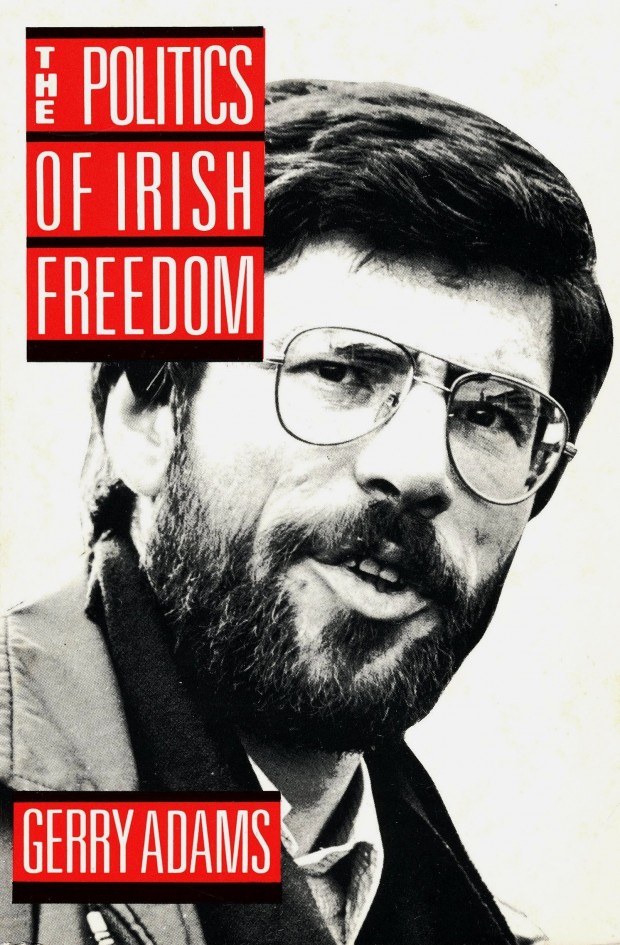3 January 2018
Proud to be a Gerry Adams republican - Eoin Ó Broin

"I am proud to describe myself as a Gerry Adams republican. More than anything else he has taught me that ours is 'an ideology of the dispossessed seeking equality'."
This week I re-read The Politics of Irish Freedom. Published in 1986 it was the first detailed account by Gerry Adams of Sinn Féin’s radical republicanism.
It was written at the height of the conflict in the North and shortly after Gerry was first elected MP for West Belfast. In part it was an attempt to break through the censorship and propaganda of the political establishment and present Sinn Féin’s republicanism on its own terms.
I first read the book in the early 1990s while living in London. It had a profound impact on my political development. Though I didn’t realise it at the time it provided me with a framework for understanding the world around me. It set me on a path that led me to join Sinn Féin, move to Belfast and become a full time political activist.
Thirty years after it first printing it has lost none of its power. Like any book, parts become outdated, overtaken by events. But at its heart is a political vision that is as relevant today as it was when I first read it.
Part memoir, The Politics of Irish Freedom provides a fascinating insight into the forces that shaped an entire generation of Irish republicans.

Belfast has always had a particularly radical republican tradition. From Mary Anne McCracken in the 1790s to Alice Milligan in the 1890s there has always been an attempt to fuse the demands for political and cultural freedom to the necessity for social and economic rights.
Alice Milligan, now virtually forgotten, was a vital link in passing on the radical United Irish Presbyterian tradition to the generation of 1916 and a key figure in both the Gaelic revival and the promotion of social justice and women’s equality.
Sovereignty, suffragism, Gaelic revivalism, trade unionism and socialism were the ingredients of the city’s radical republican tradition.
For much of Belfast’s history this left republicanism was a minority position, overshadowed by conservative and sectarian forces of Catholic nationalism and Presbyterian unionism. Partition seemed to solidify these blocks into a mutually sustaining embrace.
But the radical tradition survived in the small working class streets of West Belfast and the more affluent environs of the Antrim Road under the shadow of Cave Hill.
When the Civil Rights movement emerged to challenge the institutionalised discrimination of the Unionist Regime it combined Belfast’s own radical traditions with influences from the rising tide of international revolt.
Gerry Adams is a product of this moment in history. The political vision he articulates in The Politics of Irish Freedom is as influenced by Alice Milligan and Mary Anne McCracken as it is by the anti colonial and student movements of the 1960s and 70s.
It understands the deep interconnectedness between the democratic demand for national self determination and the myriad struggles for equality. It combines a deep hatred of Empire with a searing anger at the injustice of class inequality. It reconciles a pride in ones own culture and history with a strongly held internationalism. And it is committed to taking a stand against oppression wherever it manifests itself while always holding out the hand of peace and the opportunity for dialogue and reconciliation.
Some Sunday Business Post readers will recoil at such a positive reading of the vision contained in The Politics of Irish Freedom, conditioned as they are by a very different image of its author.
But this is how we see Gerry Adams and this is the political vision that attracted our generation of radical republicans to join Sinn Féin in the 1990s and 00s.
2018 will mark a significant turning point in the history of our party. It will bring about not just a new party leader but a generational change within Sinn Féin and broader Irish republicanism. It will reinforce the post conflict politics than now dominates Ireland, north and south.
The incoming Party President will have to steer a course through all of this with great adroitness. She will have to set out her own vision and chart her own direction in the days and weeks ahead. She will have to spearhead our organisational and electoral growth. She will have to lead us into Government north and south in order to implement our radical republican programme for change. Crucially she will have to do this while maintaining the cohesion of the broad republican family.
Replacing Gerry Adams will be a much more difficult task than some anticipate. His strategic skill and collective style of leadership have been honed over decades of struggle. He commands a loyalty and respect that are rare among modern political leaders. He will be a very hard act to follow.
Contrary to the claims of some, 2018 will not mark a break with the recent past of radical Irish republicanism, but rather the next phase in our struggle for a united and equal Ireland. The task of those that follow in Gerry Adams’ footsteps is to remain true to his vision while adapting our tactics and strategies to suit an ever changing present and future.
Thirty years after first reading The Politics of Irish Freedom and twenty two years after joining Sinn Féin I feel privileged to have known and worked directly with Gerry Adams. I am proud to describe myself as a Gerry Adams republican. More than anything else he has taught me that ours is “an ideology of the dispossessed seeking equality”.
Today more than ever our country is in need of such an ideology. And never before have those of us espousing it been better placed to implement it.
First published in the Sunday Business Post on 31.12.17



